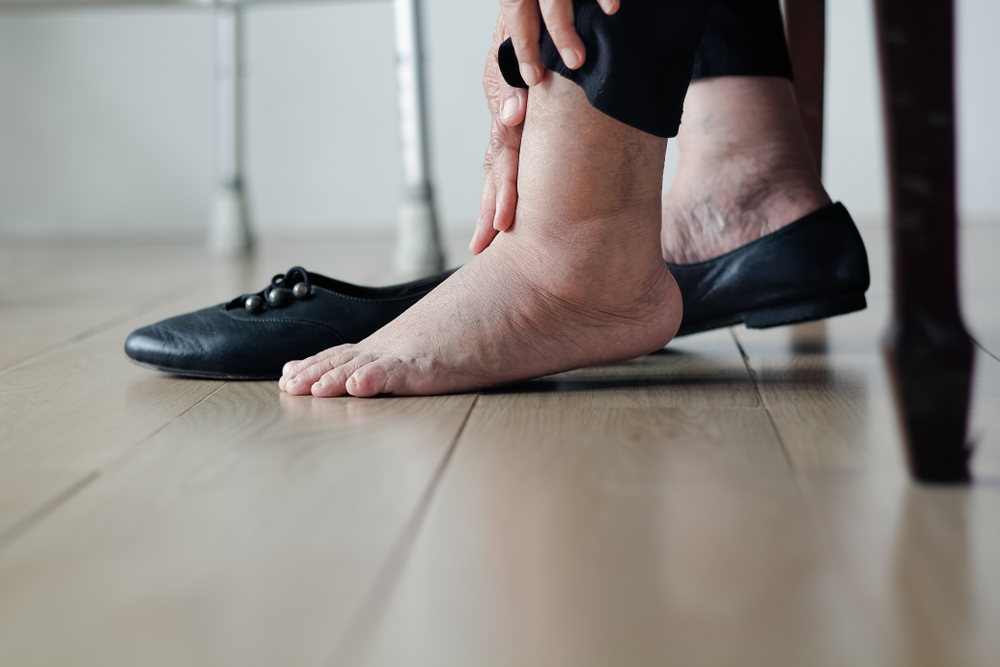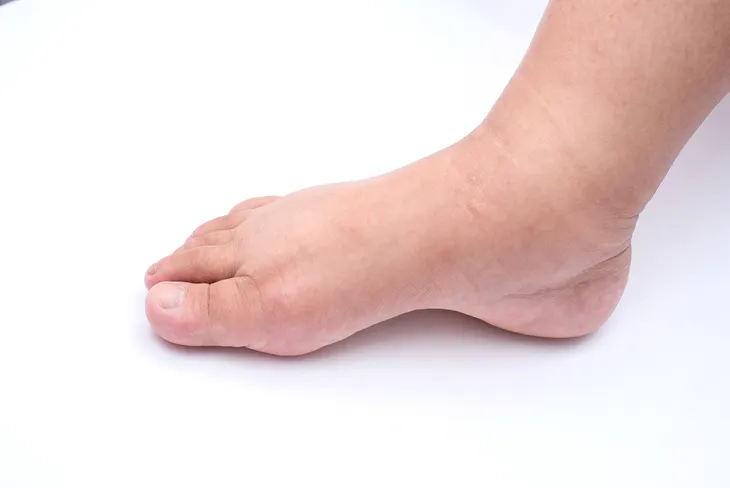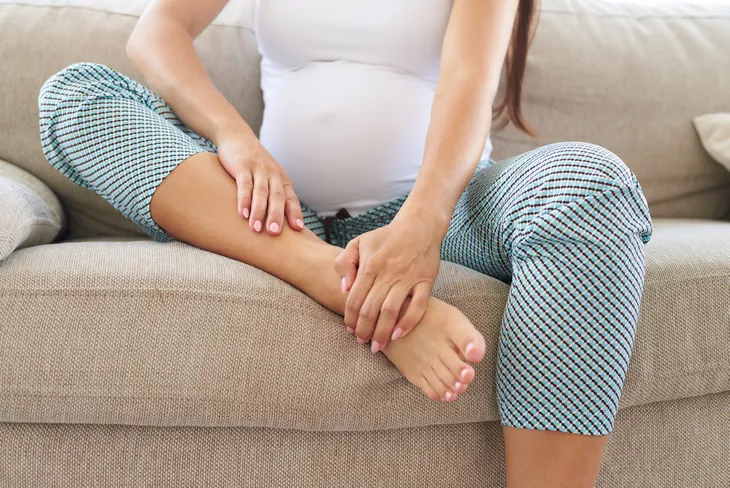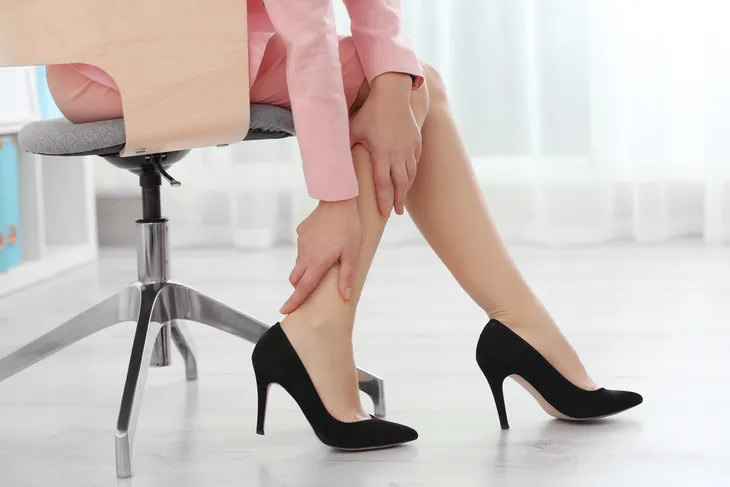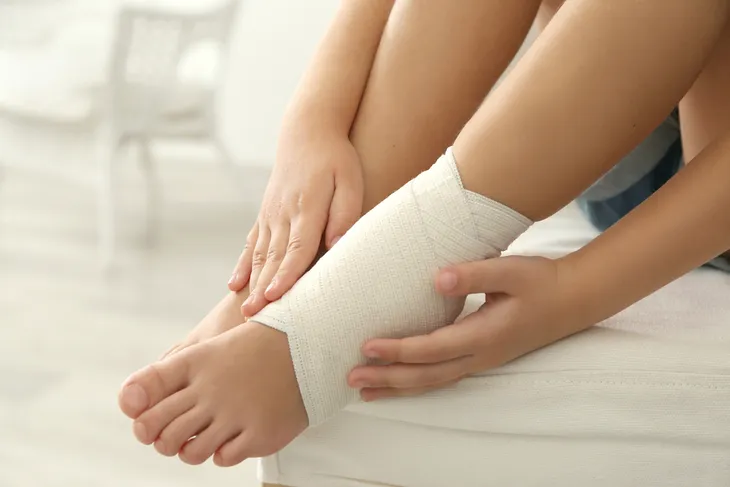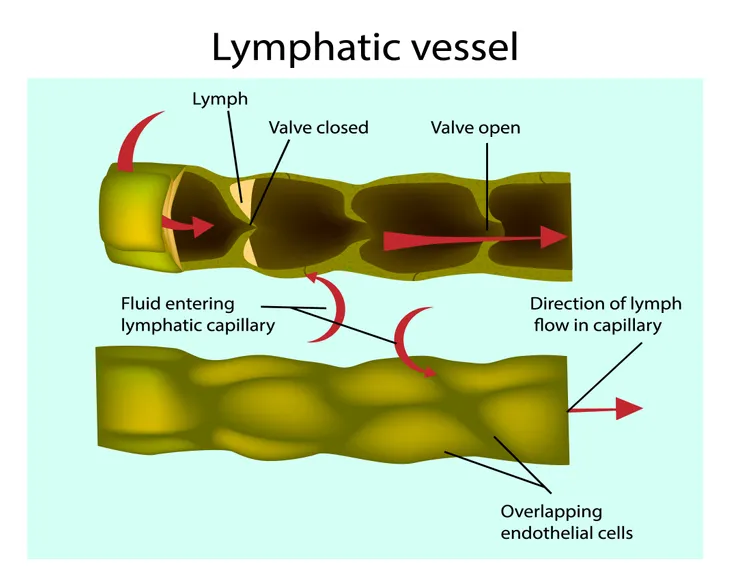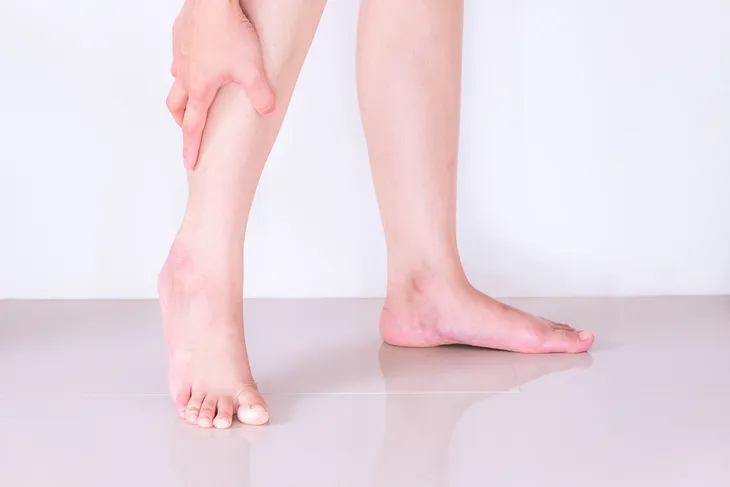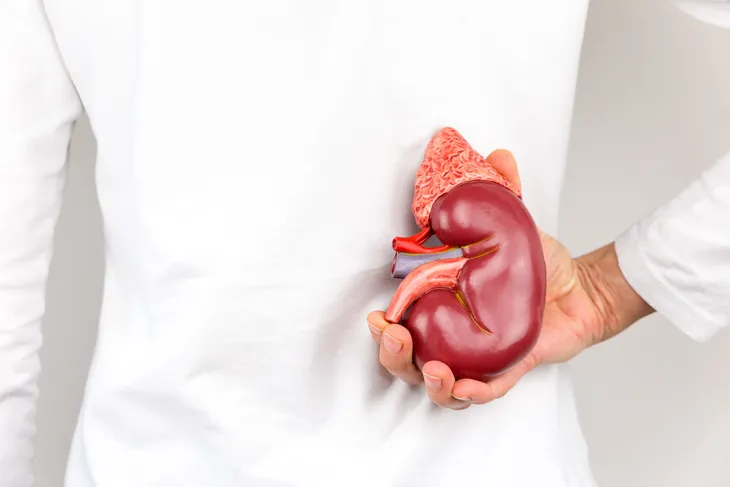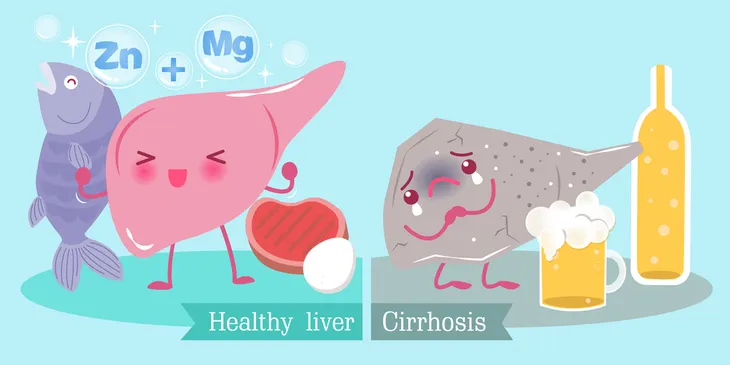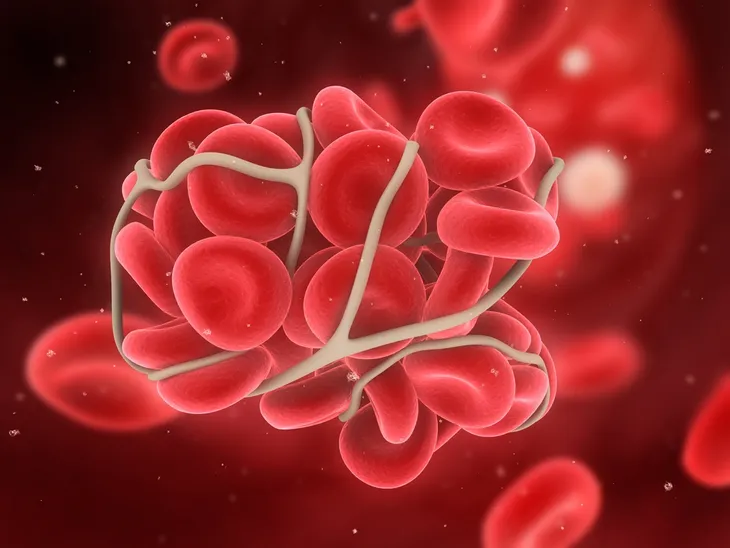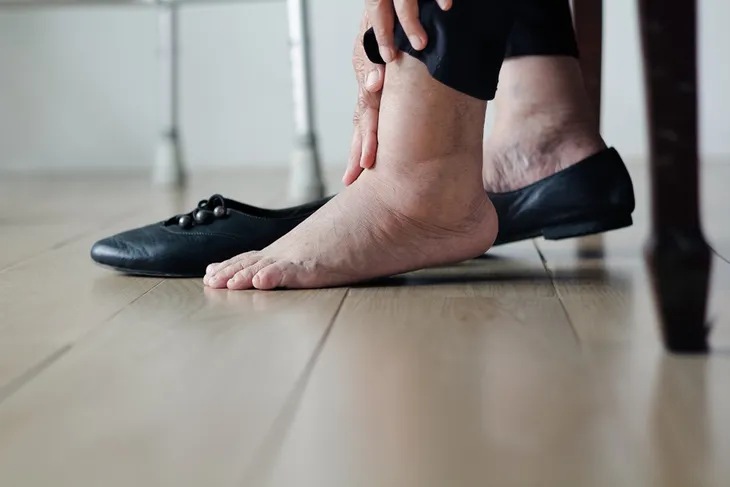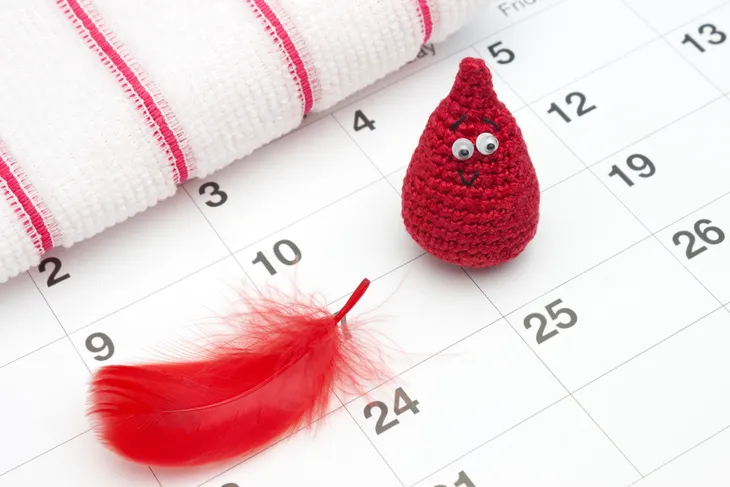Most of us have experienced puffy or swollen feet at some point or another. It can occur after sitting through a long flight, during pregnancy, or even being on your feet all day in the hot summer weather. More often than not, a swollen set of feet isn’t something to be overly concerned about.
However, if your feet become so swollen they are unrecognizable or it occurs in addition to other symptoms, it could be a result of something more serious. No matter what the cause is, it should be treated as soon as possible. There are many potential causes behind swollen feet. Sometimes it’s something as harmless as warm weather, but it can also be from diet or even certain health conditions.
If you’re someone who experiences swollen feet on a regular basis, take a moment to read about all the potential causes…
Edema
Edema is a common cause of swollen feet. This condition causes excess fluid to become trapped in the body’s tissue. “This causes swelling and puffiness of the tissue directly under your skin in your feet, ankles, and legs,” writes Healthline. However it can also occur in the hands and arms.
If edema is the cause behind your swollen feet, you’ll be experiencing a number of other symptoms. Healthline lists them as, “stretched or shiny skin, skin that retains a dimple after you press on it for several seconds, increased abdominal size,” and difficulty walking. The source notes that if it’s just a mild case of edema, it should go away on its own. If it doesn’t, try limiting your salt intake, laying down flat with your feet raised higher than your heart, wearing support stockings, taking diuretic medications, adjusting any current prescription medications, or practicing the “Legs-Up-the-Wall Pose.”
Pregnancy
It’s not all that uncommon for pregnant women to experience a little bit of swelling in their feet. Hello, they’re carrying around another person with them all day long! Prevention explains why this happens. First of all, when a woman is pregnant her body begins retaining more fluid. Also, the weight of the baby puts pressure on the pelvic floor which also puts pressure on the blood vessels in the legs. In addition to that, when a woman is pregnant, her body produces the hormone relaxin which is meant to help the pelvis relax and soften in preparation for the birth, but it can also loosen ligaments in the feet.
These things are all normal and will result in some minor swelling. However, excessive swelling in the feet throughout pregnancy is not normal, particularly if it’s accompanied by symptoms like headaches, nausea, or blurred vision. In this case, it could be a sign of preeclampsia which is dangerous and must be treated immediately, says Prevention.
Sitting or Standing All Day
People who work in jobs that require them to either sit all day (most likely at some kind of desk job) or stand all day, like doctors and nurses will find that their shoes are a little tight by the end of their shift. According to Health.com, this happens because the muscles aren’t contracting which means the venous blood is not returning to the heart as fast as it usually does. This causes swelling. For those who sit all day, try to limit crossing your legs because this can aggravate the blood vessels even more.
“There are no hard and fast guidelines, but if you’re on your feet all day long, it’s reasonable to sit five minutes every hour, or put your legs up,” says Jason Johanning, MD, professor of vascular surgery, University of Nebraska Medical Center, Omaha, to Health.com.
Foot or Ankle Injury
Another common cause of swelling is injury, particularly a sprained ankle. This type of injury can happen for a number of different reasons, some of them quite simple like just missing a step. A sprained ankle causes the “ligaments that hold the ankle in place to be stretched beyond their normal range,” writes WebMD. It’s not a complicated injury and it’s fairly common. With the proper rest and care, it should heal up on its own.
To help reduce the swelling, you should avoid walking and putting any pressure on the foot. Wrap the foot or ankle up with some compression bandage and ice the injury. If the swelling doesn’t get any better, visit a doctor.
Lymphedema
Lymphedema occurs when lymphatic fluid collects in the tissues and often develops when there is a problem with the lymph vessels or after the lymph nodes have been removed. “Lymph is a protein-rich fluid that normally travels along an extensive network of vessels and capillaries,” writes WebMD. “It is filtered through the lymph nodes, which trap and destroy unwanted substances, such as bacteria.”
The swelling occurs when there’s a problem with the vessels or lymph nodes as the fluid can become blocked. If it’s left untreated, lymph can build up, impair wound and healing, and lead to infection and deformity, says the source. “Lymphedema is common following radiation therapy or removal of the lymph nodes in patients with cancer,” explains WebMD. Former cancer treatment patients should contact their doctor immediately if they notice any swelling.
Alcohol
Most of us drink alcohol from time to time but aren’t aware that alcohol can actually lead to swollen feet because it causes our body to retain more water. If you do find that your feet are a little puffy after a night of drinking it’s nothing to be too concerned about since the swelling should go away in a few days. If it doesn’t, it might be a little more serious.
Healthline notes that the odd swelling after drinking isn’t reason for concern, but if it happens to you on a regular basis, it could indicate there’s a problem with your liver, heart, or kidneys. It also means you’re consuming too much alcohol.
The source advises treating swollen feet by drinking more water, limiting sodium, sitting with your feet elevated, or soaking them in cold water.
Hot Weather
We already talked about this one briefly, but hot weather is another common cause of swollen feet. This happens because when our body tries to cool itself down naturally, our veins expand. “Fluids go into nearby tissues as part of this process,” writes Healthline. “However, sometimes your veins aren’t able to bring blood back to the heart. This results in fluid collecting in the ankles and feet.” If you’re someone who already suffers from circulatory issues, then you’re at a higher risk of having swollen feet during warmer weather.
To help reduce the swelling, Healthline suggests soaking your feet in cool water, drinking more water, resting with your legs elevated, investing in some support stockings, walking around or doing simple leg exercises. Also avoid wearing shoes that are constricting.
Chronic Venous Insufficiency
Chronic venous insufficiency is a condition that affects the flow of blood up through the veins in the legs. It occurs when the one-way valves that keep blood flowing upward are damaged or weakened. When this happens, the blood will leak back down through the vessel and create a buildup of fluid in the soft tissue of the legs, ankles, or feet.
WebMD notes that swollen feet is often one of the first signs of chronic venous insufficiency. “Chronic venous insufficiency can lead to skin changes, skin ulcers, and infection,” writes the source. “If you experience signs of venous insufficiency you should see your doctor.”
Kidney Disease
It’s not all that surprising that any extra fluid buildup would be caused by the kidneys because this organ is responsible for balancing fluids in the body and moving unnecessary fluid out of the system, says Health.com. If it’s caused by a kidney problem like kidney disease, it could lead to too much salt in the blood which causes the body to retain water, hence the swelling in the feet, says Healthline.
“Normally people [with foot swelling] go home and put their feet up, and the body reabsorbs that little bit of extra fluid, and the kidneys just get rid of it,” says Britt Marcussen, MD, assistant professor of family medicine at the University of Iowa Carver College of Medicine to Health.com. “[With] kidney problems, your body has trouble getting rid of that fluid, then that swelling is more marked and more dramatic. A lot of people have swelling in other places too, like their hands and face.”
Liver Disease
Cirrhosis of the liver is a form of liver disease that occurs when the liver becomes scarred. It can be caused by hepatitis or years of alcohol abuse. “The scarring interferes with blood flow to and in the liver,” writes Health.com. “This causes high blood pressure in the veins going into the liver (called portal hypertension), potentially leading to swelling in both the legs and feet but also in the abdomen (called ascites).” Another reason cirrhosis causes swelling in the feet is because it interferes with the body’s ability to produce the protein, albumin.
If you experience foot swelling from cirrhosis, there are medications that you can take like diuretics, as well as some lifestyle changes. This won’t improve the condition of the liver itself, but can help relieve the symptoms associated with cirrhosis, says the source.
Blood Clot
Blood clots are another common cause of swollen legs, feet, and ankles as they typically form in the legs. Blood clots in the veins trap the flow of blood from returning back up to the heart which is what causes the swelling. “Blood clots can be either superficial (occurring in the veins just beneath the skin), or deep (a condition known as deep vein thrombosis),” explains WebMD. “Deep clots can block one or more of the major veins of the legs.” If this happens, they can be dangerous and even life threatening as they have the potential to break off and travel into the heart or lungs.
WebMD warns that anyone with swelling in one leg which may even change color, along with pain, and a low-grade fever should seek medical attention right away. If caught early, blood clots can be treated with blood thinners, if necessary. To learn more, check out this article on the warning signs and symptoms of a blood clot in the leg.
Infections
People with diabetes are more prone to develop swelling in their feet as a result of an infection. This is particularly common in people with diabetic neuropathy or other nerve problems, says WebMD, because their feet are at a higher risk for foot infections. “If you have diabetes, it is important to inspect feet daily for blisters and sores, because nerve damage can blunt the pain sensation and foot problems can progress quickly,” writes the source.
Keep an eye out for blisters on the feet that appear to be infected. If you find one, seek medical attention right away.
Medication Side Effects
If you’re noticing that your feet are getting swollen and you’ve recently started taking a new medication it could be a side effect of your meds. There are certain medications like steroids, oral contraceptives, antidepressants (like tricyclics and MAO inhibitors), diabetes medications, or types of blood pressure medication called calcium channel blockers that are known to cause the body to retain water and create swelling, says Prevention.
If you suspect your medication is the cause behind your swollen feet, contact your doctor. In some cases the medication cannot be changed and if it’s doing more help than harm, you may have to consider switching up your footwear and look into some remedies!
Consuming Too Much Salt
It’s not uncommon for the average person to be consuming more than their fair share of salt. This is because it’s hidden in a lot of the foods we eat on a daily basis like processed foods or food from a restaurant. Just because you don’t overuse the salt shaker doesn’t mean you’re not guilty of consuming too much salt. A diet that is high in sodium is one of the most common reasons behind water retention in the body.
To gauge how much salt you should be eating, the American Heart Association recommends adults consume no more than 2,300-milligrams of salt a day which is about a teaspoon. “I advise my patients to really look at labels of all their food, to see how much sodium is in their diet soda, canned soups, microwave dinners, and to consume no more than 2,000 to 2,400-milligrams per day,” says Britt H. Tonnessen, MD, a Yale Medicine vascular surgeon to Prevention.
Hormone Fluctuations
Sorry ladies, but in addition to painful cramps and mood swings, you might also suffer from bloating and swollen feet during those hormone fluctuations that happen around your menstrual cycle. These hormone changes cause the body to retain more fluids in the week or so before your period which is what’s causing those swollen hands and feet.
“You can feel a little puffy or swollen for sure,” says Britt Marcussen, MD, assistant professor of family medicine at the University of Iowa Carver College of Medicine when talking to Health.com. “It’s noticeable in the legs and feet, where it tends to pool because of gravity.”
